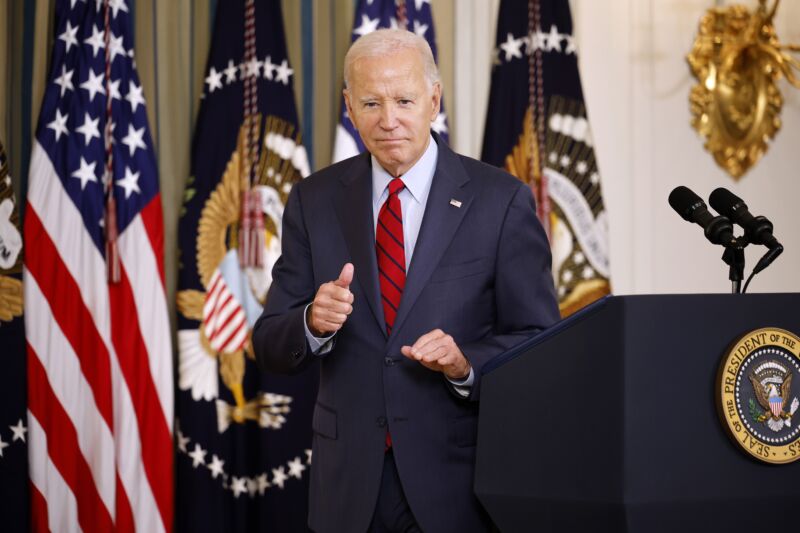
The White House and FBI likely violated the First Amendment by coercing social media platforms into moderating content and changing their moderation policies, the US Court of Appeals for the 5th Circuit ruled Friday. The Centers for Disease Control and Prevention also acted improperly but did not “coerce” social networks, the ruling said.
However, the appeals court threw out the majority of a controversial preliminary injunction that ordered the Biden administration to halt a wide range of communications with social media companies. The injunction issued by a US District Court judge in July was far too broad and vague and applied to too many government officials, a three-judge appeals court panel unanimously decided.
The ruling on Friday involves a case in which the states of Missouri and Louisiana and other plaintiffs sued President Biden and his administration.
“The Plaintiffs—three doctors, a news website, a healthcare activist, and two states—had posts and stories removed or downgraded by the platforms,” the appeals court wrote in a summary of the case. “Their content touched on a host of divisive topics like the COVID-19 lab-leak theory, pandemic lockdowns, vaccine side-effects, election fraud, and the Hunter Biden laptop story. The Plaintiffs maintain that although the platforms stifled their speech, the government officials were the ones pulling the strings—they ‘coerced, threatened, and pressured [the] social-media platforms to censor [them]’ through private communications and legal threats.”
The injunction previously issued by Judge Terry Doughty, a Trump nominee at US District Court for the Western District of Louisiana, prohibited Biden administration officials from communications with social media companies that fall under 10 broadly written categories. The injunction was only in place for about a week and a half because the 5th Circuit temporarily blocked the order on July 14 and conducted an expedited review.
Injunction “vague and broader than necessary”
The September 8 order allows a greatly modified version of the injunction to take effect:
The preliminary injunction here is both vague and broader than necessary to remedy the Plaintiffs’ injuries, as shown at this preliminary juncture. As an initial matter, it is axiomatic that an injunction is overbroad if it enjoins a defendant from engaging in legal conduct. Nine of the preliminary injunction’s ten prohibitions risk doing just that. Moreover, many of the provisions are duplicative of each other and thus unnecessary.
Prohibitions one, two, three, four, five, and seven prohibit the officials from engaging in, essentially, any action “for the purpose of urging, encouraging, pressuring, or inducing” content moderation. But “urging, encouraging, pressuring” or even “inducing” action does not violate the Constitution unless and until such conduct crosses the line into coercion or significant encouragement…
The eighth, ninth, and tenth provisions likewise may be unnecessary to ensure Plaintiffs’ relief. A government actor generally does not violate the First Amendment by simply “following up with social-media companies” about content-moderation, “requesting content reports from social-media companies” concerning their content-moderation, or asking social media companies to “Be on The Lookout” for certain posts. Plaintiffs have not carried their burden to show that these activities must be enjoined to afford Plaintiffs full relief.
Under these restrictions, “it is not clear whether the Surgeon General could publicly urge social media companies to ensure that cigarette ads do not target children,” the ruling said.
One prohibition will take effect
One of the 10 prohibitions will take effect, but even that one was modified by the appeals court. The original version barred officials from “threatening, pressuring, or coercing social-media companies in any manner to remove, delete, suppress, or reduce posted content of postings containing protected free speech.”
But as the appeals court noted, “those terms could also capture otherwise legal speech. So, the injunction’s language must be further tailored to exclusively target illegal conduct and provide the officials with additional guidance or instruction on what behavior is prohibited.”
The appeals court’s standard practice is to remand a decision to the lower court to alter the injunction in accordance with the ruling. “But this is far from a standard case. In light of the expedited nature of this appeal, we modify the injunction’s remaining provision ourselves,” the Friday ruling said.
The ruling modified the prohibition to state the following:
Defendants, and their employees and agents, shall take no actions, formal or informal, directly or indirectly, to coerce or significantly encourage social-media companies to remove, delete, suppress, or reduce, including through altering their algorithms, posted social-media content containing protected free speech. That includes, but is not limited to, compelling the platforms to act, such as by intimating that some form of punishment will follow a failure to comply with any request, or supervising, directing, or otherwise meaningfully controlling the social-media companies’ decision-making processes.
“Under the modified injunction, the enjoined Defendants cannot coerce or significantly encourage a platform’s content-moderation decisions,” the court wrote. “Such conduct includes threats of adverse consequences—even if those threats are not verbalized and never materialize—so long as a reasonable person would construe a government’s message as alluding to some form of punishment.”
https://arstechnica.com/?p=1967034

